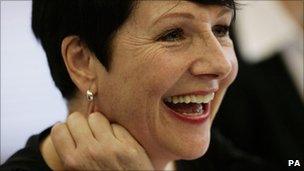Campaigners applaud Miriam O'Reilly's tribunal win
- Published

O'Reilly said taking the BBC to an employment tribunal was the right thing to do
Campaigners have welcomed a tribunal's finding that the BBC discriminated against TV presenter Miriam O'Reilly on the grounds of her age.
Michelle Mitchell, director at Age UK, said the ruling sent out a "powerful signal" against age discrimination.
Esther Rantzen said it would "make people question their own attitudes".
The BBC has apologised to O'Reilly, 53, who was dropped from the rural affairs show Countryfile when it moved to a primetime slot.
O'Reilly, who lost her sexual discrimination claim, said she had endured "an incredibly stressful 14 months" since launching her claim but the outcome had "implications for all broadcasters".
"I did this because it was the right thing to do - I couldn't have lived with myself if I'd just walked away," she said.
O'Reilly added: "It was hard taking on the BBC as I love the BBC but I felt I was treated badly."
'Landmark decision'
Broadcaster Dame Joan Bakewell, who is a former government advisor on older people's issues, said the outcome was a "landmark decision" that showed that ageism could be brought to a tribunal.
"We can't afford to have people living for 30 years on a pension in retirement, we have to have a culture in which older people work on a par with younger people," she said.
Gloria Hunniford, who presents the BBC prime time programme Rip Off Britain, expressed admiration for O'Reilly for fighting her corner but said she did not believe the BBC was ageist.
"You only have to look at something like The One Show, you have reporters there that are in their 80s and the reality is that it isn't all about young people," she said.
Creative Director for the BBC, Alan Yentob: ''We didn't get it right''
Age UK's Ms Mitchell said "the idea that wrinkles or grey hair can sound the death knell for the careers of female TV presenters was beyond appalling" and called for broadcasters to "start offering a more honest portrayal of our society to their viewers".
But television presenter Nick Ross said broadcasters should be free to change presenters to "freshen up" long-running programmes.
"I think one has to feel rather sympathetic to the BBC, they are trying to move things along, they are trying to refresh things, and occasionally the presenters get moved to one side, that's life," he said.
O'Reilly, along with Juliet Morris and Michaela Strachan, lost her job on Countryfile ahead of its move to Sunday evenings in April 2009.
She was told in November 2008 she was being dropped after working for eight years as a freelance presenter on the show.
The BBC said in a statement that it accepted the findings of the tribunal.
"The BBC is committed to fair selection in every aspect of our work and we clearly did not get it right in this case," it said.
High definition
Senior managers who made decisions on presenters would undergo additional training on selection and appointment and new guidance would be issued, it added.
"We would like to acknowledge the important contribution Miriam has made to the BBC over more than 20 years and we would welcome the opportunity to discuss working with her again in the future," the statement said.
O'Reilly later said she was "impressed" that the corporation had apologised and would like to work for it again.
The tribunal heard allegations that O'Reilly had been asked if it was "time for Botox" and was warned to be "careful with those wrinkles when high definition comes in".
O'Reilly told the tribunal she was not given a reason for her departure and was told only that Countryfile was being "refreshed".
"Being dropped from the programme, I believe because of my age and sex, really affected my confidence," she said.
But former BBC One controller Jay Hunt told the tribunal the claims were "entirely and categorically untrue" as well as "profoundly distressing and utterly offensive".
Hunt argued that the only reason for O'Reilly's departure was because she was not recognisable to a peaktime audience.
- Published10 November 2010
- Published4 November 2010